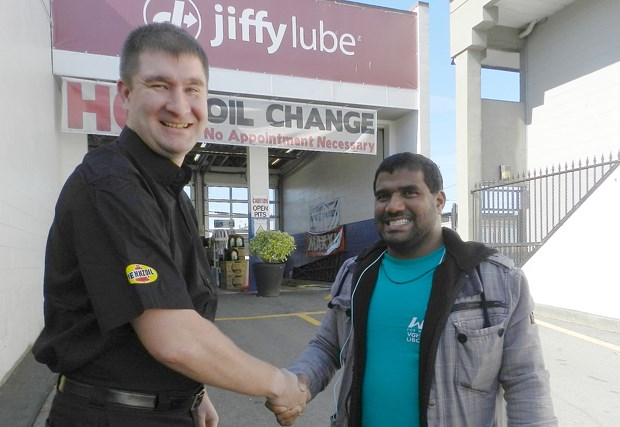Is there a level playing field for disabled workers competing for a job in today’s marketplace?
While many like to think so, attitudes fashioned by fear and a lack of education about what it actually takes to have a disabled employee as part of the workforce can provide very real barriers.
That was part of the discussion around the Richmond Centre for Disability’s gathering with a small group of local employers on Monday, designed to promote and bring awareness to hiring people with a disability.
One person who has experienced just about every reaction during job interviews was Eileen Kalshoven, RCD’s executive assistant since 2001. Some interviews have been good. Others have been awful. In the end, she said the advice her parents gave her to be as independent as possible has been good counsel.
Kalshoven contracted polio when she was 18 months old, leaving her with a lifelong disability. She has used canes and now a wheelchair for mobility.
“But all of my working life I’ve had a job,” said Kalshoven, 61. “But it’s not easy getting a job when you have a disability.
“My parents told me that just because I was disabled, don’t expect people to look after you. You’ve got a brain in your head, use it.”
One of her negative experiences involved a job she applied for in her 20s in her native Zimbabwe.
“I remember the place where the job interview was, there must have been about 30 steps to the front door. “But I made it,” she said, adding at that time she walked with the use of canes.
“The gentleman who interviewed me said, ‘I don’t really have a job for you, I just wanted to see what you looked like,’” she said. “I said to him, I don’t have horns growing out of my head, and even if you did have a job for me, with your attitude I wouldn’t want to work for you anyway.
“I’m cheeky that way. But you’ve got to have a thick skin when you have a disability, because if you think everybody is going to be nice to you, forget it.”
Other interviews showed an understanding for what disabled people face.
At a different workplace interview, where a series of steps were a challenge, Kalshoven told the employer they were going to be a bit of problem for her.
“And he told me, ‘Look, I am not interviewing you to find out if you can get up the steps, I am interviewing you to see if you can do the job.”
Generally, the public can have a fear of the unknown when it comes to the needs of the disabled worker, Kalshoven said.
Fuelling part of that fear is a variety of myths about the extra costs disabled workers bring to a potential employer.
Louise Gaudry, RCD’s career development facilitator told the audience among the concerns is an anticipated rise in WorkSafeBC rates.
“This is not true. In fact, insurance rates for employers are determined by health and safety risks from the type of business, the size of payroll and the health and safety record of the company,” she said. “The level or ability or disability of an employee has no impact on insurance rates.”
Also untrue is the cost of accommodating a disabled employee in the workplace, Gaudry said.
“Research cited in the Conference Board of Canada’s tips for hiring people with disabilities indicates that less than eight per cent of people with disabilities who are employed need any form of accommodation. In many cases, an employee already has the special equipment they need. If not, there are government programs available to assist them with these costs.”
As for potential wage gaps for disabled workers, that usually depends on the level of education an individual has, said Ian Yeung RCD’s career development facilitator.
According to Conference Board of Canada data this country is given an “A” rating for having the income of people with disabilities pegged at 87 per cent of that of people without disabilities.
That 87 per cent figure is significantly higher than that in Australia (68 per cent) and the U.S. (69 per cent), but lower than in Sweden (93 per cent).
But regardless of the job and wage, whether or not to hire a disabled person often comes down to attitudes of employers.
One who managed to see through an invisible disability was Shaun Hussman who runs the Jiffy Lube location on No. 3 Road across from Lansdowne Centre.
For the past three years he’s employed Aaquil Datoo, who has a learning disability, to promote the oil change business by parading up and down the sidewalk with a sign.
“I was looking for someone who was enthusiastic about doing the job of holding the sign and he was really excited about it,” Hussman said. “I didn’t have any problems working with someone with a disability. I knew there’d be some hurdles, but honestly, there weren’t any with him.
“Aaquil, he’s my eyes and ears. He really is. I wouldn’t give him up.”
Another employer keen to provide work for challenged workers is Owen Barclay who runs Accessable Home and Property Services Ltd. which specializes in renovating living spaces for disabled and aging people.
Barclay said he makes a point of hiring people with addiction problems.
“I think that people with disabilities offer some tremendous advantages to employers,” Barclay said. “The big thing for the employer, though, is to not hesitate to interview people. And if you’re unsure of their abilities ask them questions that can explain they have the skills to do to the job, or not.
“Treat them as you would anybody else.”



